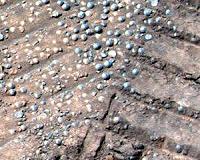 |
Rolla MO (SPX) Jan 12, 2010 By the time Curiosity, the next Mars Rover, launches in 2011, scientists on Earth will know more about the potential for life on Mars because of microorganisms that live in Australian lakes. Microbiologists like Dr. Melanie Mormile from Missouri University of Science and Technology are studying organisms found in the salt-water lakes of western Australia that have an acidic pH because the lakes' conditions are similar to those found on Mars. Mormile's research findings was published in the journal Astrobiology Dec. 30. Until recently, it was thought that life could not be sustained in lakes like those Mormile studied in Australia, which tend to have a high concentration of metals and other ions due to the type of rocks that form the lake floors. Mormile and her fellow researchers found that prokaryotes, simple organisms that lack a nucleus, were able to handle the unusual conditions. "When you look at these extreme environments, only the prokaryotes have the metabolic capability to survive," Mormile says. Mormile's group took samples from 11 lakes in western Australia. They found a great deal of diversity among bacteria present in each. The diversity was grouped by the environmental conditions present in each of the lakes. In the future, Mormile hopes to return to Australia to isolate and characterize the bacteria in each of four of the lakes originally sampled to determine what, if any, new species may be thriving there. Once Mormile knows what organisms are present in the lake, she can then determine things like how they consume carbon sources and produce energy. Knowing the types of metabolism present in these acidic high-saline lakes would help researchers understand the metabolism required for life on Mars. Mormile sees no end to the knowledge that can be gained from this research. "Once you start answering questions, new questions always surface," she says. She also hopes to explore potential applied uses for the microbes she finds. "I want to determine if any of the organisms can be used in bioremediation," Mormile says. "They might also have industrial uses. For example, there may be enzymes present that could be used as cleaning agents." Whether or not Mormile's research leads to a definitive answer about life on Mars, she and her colleagues showed that life does exist in the extreme environments found in acidic salt-water lakes in Australia. "As a microbiologist, it seems obvious that wherever there is liquid water, there is usually life present," Mormile says. "Just because you can't see it with the naked eye, doesn't mean it isn't there." Working with Mormile on this project were Bo-Young Hong, a Ph.D. student at Binghamton University who earned a master of science degree in biological sciences from Missouri S and T in 2007, and Kathleen Benison, a geologist at Central Michigan University.
Share This Article With Planet Earth
Related Links Missouri University of Science and Technology Mars News and Information at MarsDaily.com Lunar Dreams and more
 How To Find Signs Of Life On Mars
How To Find Signs Of Life On MarsMoffett Field CA (SPX) Dec 18, 2009 Certain environments on Earth that host life are very similar to places on Mars and other terrestrial planets, scientists have found. So if life can exist here, why not there? Nora Noffke is a geobiologist at Old Dominion University in Norfolk, Virginia. She has found evidence of microbial life all over the world - in both modern and in fossil coastal areas. Bacteria that grow on beach ... read more |
|
| The content herein, unless otherwise known to be public domain, are Copyright 1995-2009 - SpaceDaily. AFP and UPI Wire Stories are copyright Agence France-Presse and United Press International. ESA Portal Reports are copyright European Space Agency. All NASA sourced material is public domain. Additional copyrights may apply in whole or part to other bona fide parties. Advertising does not imply endorsement,agreement or approval of any opinions, statements or information provided by SpaceDaily on any Web page published or hosted by SpaceDaily. Privacy Statement |